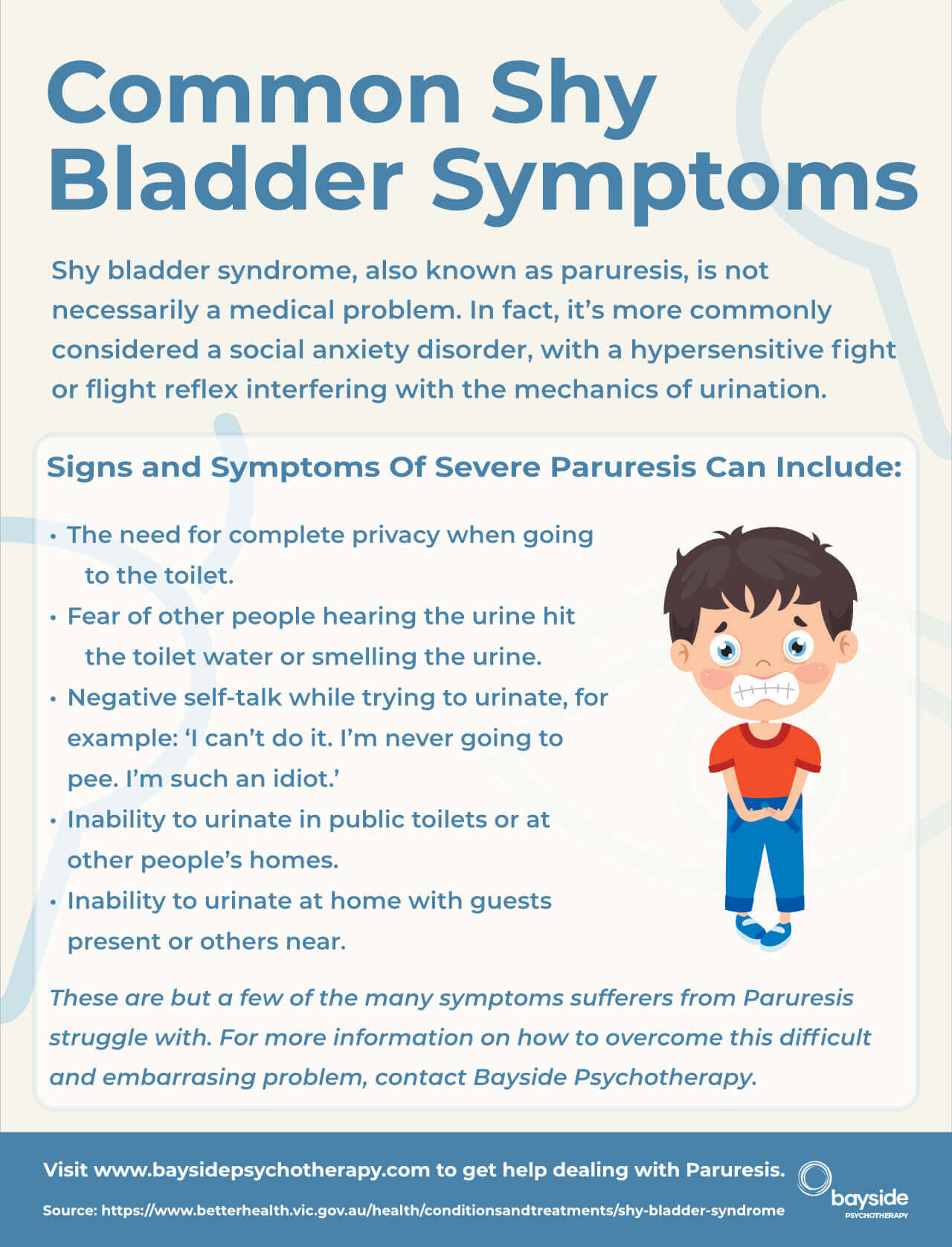Shy bladder syndrome, also known as paruresis, is not necessarily a medical problem. In fact, it’s more commonly considered a social anxiety disorder, with a hypersensitive fight or flight reflex interfering with the mechanics of urination.
Affected individuals can struggle to urinate in a public toilet or in any situation when someone might be listening. This can have various repercussions, from simple embarrassment to avoiding long outings or trips, even forgoing career opportunities or missing family events. The condition may be connected to childhood trauma or just a genetic predisposition to anxiety. But whatever its origins or triggers, counselling may be what you need to help you get to the bottom of the problem.

What Is Shy Bladder Syndrome?
Shy Bladder Syndrome is a condition where someone experiences high anxiety levels when they have to use the toilet in public places, usually because they’re afraid. Although not a mental illness, Shy Bladder Syndrome is classified as a social phobia and does indicate a mental health condition that needs support and treatment.
Sufferers of Shy Bladder Syndrome may avoid travelling, working and even socialising for fear of needing to pee in public.

What Are The Symptoms of Shy Bladder?
Paruresis, also known as shy bladder, is a condition where an individual has a fear of urinating and finds it challenging to urinate in public restrooms or when around other people. Recognising the symptoms is the first step towards seeking effective treatment and regaining control over one’s life and bladder. At Bayside Psychotherapy, we’ve highlighted the common signs associated with shy bladder to help you understand this condition better:
One of the most telling symptoms of paruresis is the inability to urinate in public places, even when the need or urge is there. This difficulty can range from mild hesitation to complete inability. Another symptom is the need for complete privacy when using the restroom, often waiting for it to be empty or choosing stalls farthest from others.
People with paruresis might also experience anxiety or fear about upcoming types of social events where they might have to use public restrooms, during travel or events. This anxiety can sometimes lead to physical symptoms like a rapid heartbeat, sweating, or tremors. In severe cases, some might limit their fluid intake to avoid using the restroom when out, which can have adverse health implications.

Pervasive Implications of Paruresis
The impact of paruresis, or shy bladder syndrome, on an individual’s life. Here are the key impacts:
- Physical Discomfort: Inability to empty your bladder when needed often leads to prolonged periods of holding in urine, without treatment it can result in urinary tract issues or kidney problems.
- Emotional Turmoil: Paruresis typically causes feelings of embarrassment, shame, and even frustration due to having no ability to urinate. This can lead to a decreased self-esteem or a diminished sense of self-worth, further adding to anxiety.
- Social Limitations: Sufferers may have avoided leaving the house due to being unable to urinate. They will avoid social gatherings, sporting events, travel, or other social events due to a fear of urinating in public.
- Mental Exhaustion: Constant anxiety about peeing when you’re in public situations can be mentally draining, contributing to general anxiety or making any other mental health issue worse.
- Lifestyle Adjustments: Some might limit fluid intake to reduce the need for restrooms when outside, which can have adverse health implications.
Need shy bladder syndrome hypnotherapy?
Connect With a Therapist
How Does Bayside Psychotherapy Approach Treatment for Shy Bladder?
Our counsellors take the time to learn about you and your situation. This enables us to tailor treatment methods or combine several approaches to come up with a plan to work best for you. All your treatment — whether face to face or remotely via a secure online platform — will be conducted in a safe, supportive and non-judgemental environment.
How Soon Will I Feel Improvement?
The causes and severity of your paruresis will be unique to you, so the duration of your treatment will also depend on your own circumstances and response to treatment. Some people may take just a few weeks, while others may need regular treatment over a long period to address more underlying issues. Your counsellor will assess your progress regularly to make sure your treatment is having the desired effect, and consult with you about when to start spacing out sessions in view of concluding them.
Think about how much easier your life would be without having to take your shy bladder into consideration every day.
Seek Treatment For Shy Bladder With Bayside Psychotherapy
The trained behavioural therapists at Bayside Psychotherapy have extensive experience with treatment for paruresis and people with shy bladder, along with other effects of anxiety. With training in a wide range of therapy methodologies, our practitioners can tailor a course of treatment to your particular needs.
We also recommend you download our targeted self-hypnosis recording for Shy Bladder to complement your counselling.
Give us a call on (03) 9557 9113 or use our contact form to find out more about how we may be able to help you work through your difficulties with urination.
You can also book an appointment by using our online booking form for online appointments. Or, if you prefer, you can book an in-clinic session.
Let’s work together to find out if we’re able to stop your bladder issues from limiting your social life.
Note: Whilst we will do our best to assist you, we rely upon your commitment to and participation in the treatment process to optimise results. Although some of our therapists work with people presenting with this condition, no guarantees of any outcomes can be made.









